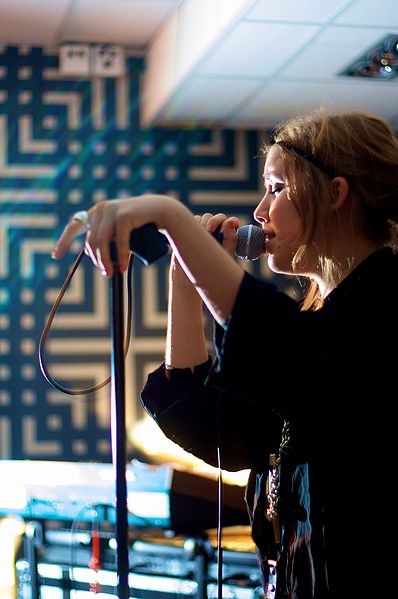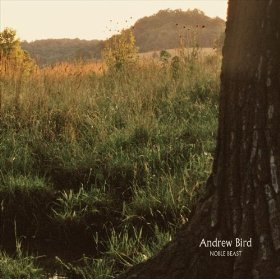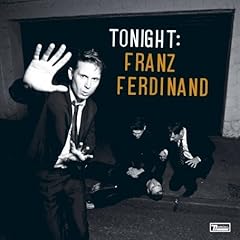28 January 2009
Vicky Cristina Barcelona
Posted by
Künstlicher
at
23:15
0
comments
![]()
Labels: Academy Awards, Barcelona, cinema, Javier Bardem, marriage, Oscars, Penelope Cruz, review, romance, romantic comedy, Scarlett Johansson, Spain, Valentine's Day, Vicki Cristina Barcelona, Woody Allen
Under the Influence: Lykke Li
"I don’t normally get influenced by a song or a beat. If I hear a tragic story, someone talking about something that went wrong, that’s what influences me, broken destinies and broken souls. I can’t listen to anybody for long, everything from hip hop to jazz and soul, the Velvet Underground and that kind music, but I don’t have any pop artists that I think are amazing. I love Lauren Hill, but I don’t think of her when I write a song. I’d like Usher to remix one of my songs. It’d be really funny to hear.
Posted by
Künstlicher
at
20:23
4
comments
![]()
Labels: Bon Iver, Edith Piaf, influences, Lauren Hill, Little Bit, Lykke Li, Madonna, music, Paolo Coehlo, Usher, Velvet Underground, Youth Novels
The Day the Earth Stood Still
If there were an award for the most ridiculously overblown environmentally-conscious film of the year, The Day the Earth Stood Still would be a strong contender to knobble The Happening from its throne. Keanu Reeves phones it in as Klaatu, reprising his role as a bland slimy embryonic automaton, hellbent on saving the earth from the vaguely hinted-at traumas that we’ve inflicted upon it (despite at no point conveying the sagacious solution he seems to possess). Jaden Smith is bratty and annoying, and Jennifer Connolly’s turn as scientist Helen Benson is about as emotionally rewarding as the incessant product placement which undermines the scarcest chance of engagement in each scene. One of the film’s most eye-rollingly, inadvertently comical moments comes when the ever po-faced Klaatu orders Helen to pull over, to decide the fate of the world in a McDonalds, whose logo, specific meals and drinks radiate from the screen.
Posted by
Künstlicher
at
20:22
0
comments
![]()
Labels: automaton, blockbuster, Day the Earth Stood Still, embyo, Jaden Smith, Jennifer Connelly, Keanu Reeves, Klaatu, McDonalds, The Happening
Beirut - March of the Zapotec/Realpeople Holland
Zapotec/Realpeople is a total identity crisis of a record, which deepens the furrows of the conundrum surrouding Zac Condon – is he a genuinely talented, tortured artist, yet to find himself in any corner of the world? Or, should the spell of his truly glorious first album, ‘The Gulag Orkestar’, be lifted, would he be nothing more than a disaffected rich kid, traveling the world in search of indigenous musical dialects to pilfer and plagiarise as his own? On ‘March of the Zapotec’ (named after a Mesoamerican people) a rambunctious, carnivalesque array of trumpets and percussion erupt on ‘El Zocalo’ as if leading a merry band down a sunlit dusty Mexican street, while ‘La Llorona’ deepens to more sophisticated, crepuscular tones, Condon’s languid voice swimming amongst elephantine horns in search of a girl, and ‘The Akara’ wordlessly mourns a nameless monarch in the court of Beirut, before a picaresque ukelele flamencos in. Take away the traditional Mexican band on this EP, and it’s hard to know what the songs would otherwise amount to. ‘My Night with the Prostitute from Marseille’, the first track from ‘Realpeople Holland’, is a whole different kettle of fish – magpie-attracting charms of the glimmeringly electronic, sleepy Eurodance beneath contrast interestingly with Condon’s sympathetic, fathoms-deep élan – it’s not dissimilar to the Postal Service gone Europop. Closer ‘No Dice’ could be the demure cousin of post ‘Hissing Fauna…’ of Montreal, a thumping, engulfing assault of reverberating drums, pretty camp, and were it not for the picture on the sleeve, entirely unrecognizable as Beirut. Desirable as it is to be objective, it’s extraordinarily difficult not to be won over by the self-effacing charm of this picaresque young gentleman.
Posted by
Künstlicher
at
20:18
0
comments
![]()
Labels: Beirut, Europop, Grizzly Bear, Gulag Orkestar, Hissing Fauna, horns, Mesoamerica, My Night with the Prostitute from Marseille, of Montreal, Realpeople Holland, Zac Condon, Zapotec
27 January 2009
Andrew Bird - Noble Beast
Andrew Bird is as delightfully neurotic about musical perfectionism as they come. Over the last nine months or so, he blogged meticulously for the New York Times about the gestation period of his 11th album, ‘Noble Beast’ – partially recorded in Wilco’s studio, inspired by the helplessness of children crying on planes, and deliciously obsessed with the consonance of words, even making them up, if need be, to rumble pleasingly down his ornate, violin-led beautiful songs.
Posted by
Künstlicher
at
23:50
1 comments
![]()
Labels: Andrew Bird, Arthur Russell, Bryter Later, Cormac McCarthy, neurotic, New York Times, Nick Drake, Noble Beast, Rufus Wainright, Souverian, Van Dyke Parks, Wilco
18 January 2009
Interview/Review: Franz Ferdinand
Although ‘Tonight: Franz Ferdinand’ hasn’t been a long time coming in the ‘Chinese Democracy’ stakes, the nigh-on four years between ‘You Could Have it So Much Better’ and its follow up mean that the band are jumping into the depths of an unfamiliar scene – no longer are they the doyens of the charts, atop every NME reader’s cultural compass. When they assaulted the charts with ‘Take Me Out’ in 2003, they sat alongside Razorlight and Keane as part of a triumvrate of intelligent (that might be generous with regard to Razorlight…) alternative music set to rescue the charts from manufactured pop pap, but as frontman Alex Kapranos sighs, “when we first appeared there weren’t many guitar bands in the chart, just a lot of formulaic pop music, and now, there seems to be a degree of formulaic guitar bands kicking around.” The question seems to be, will the dandified, articulate Glaswegian quartet be able to stand out in a scene of brash, meatheated dirty ladrock?
Posted by
Künstlicher
at
01:42
0
comments
![]()
Labels: Afrobeat, Franz Ferdinand, Glasgow, Katherine Kiss Me, Keane, Lucid Dreams, NME, No You Girls, Razorlight, Take Me Out, Tonight, Ulysses, What She Came For, Xenomania
2 January 2009
Bon Iver - Blood Bank EP

It’s hard to write about Bon Iver without disintegrating into plaid shirt cliches and log cabin metaphors (not to mention melancholy), but there’s something so whiskey-hazed warm and familiar about the opening hymnal notes of ‘Blood Bank’ that it’s hard not to. Throw in some trademark gruff falsetto crooning about kisses in the snow and the creak of Christmas morning, and you’ve pretty much got a Pitchfork reader’s wet dream right there. But all crassness aside, this is the kind of EP that makes you want to embrace under the covers all weekend, avoiding the harsh chilling bite of reality whilst swooning to the ‘Wolves Pt. I & III’-esque “I know you well” refrain. The identikit reviews which trailed ‘For Emma, Forever Ago’ labelled it as being haunting, but rather than pressing you to confront ghosts and skeletons that you’d rather forget, ‘Blood Bank EP’ is more akin to the comforting spirit of a lost friend, there to hold you through lock and key protected feelings and make you realise that it’s not so bad after all. The folorn romantic of Justin Vernon’s debut remains only in tone (there’s seemingly a Mrs Iver on the scene), as he heavily accepts the reproductive purpose of humans on ‘Babys’ (sic), which opens with a peculiarly detached cinematic feel. It’s only ‘Woods’ that jars, a vocoder-ed baying at the moon that’s so uncharacteristically Bon Iver that you wonder whether it’s a flippant musical two fingers up to the critics who pigeonholed his debut. But that aside, anyone who’s spent 2008 holed up in their bedroom trying to stop tears falling into their keyboard whilst listening to ‘For Emma…’ isn’t about to be granted a reprieve with ‘Blood Bank’.
Posted by
Künstlicher
at
13:05
0
comments
![]()
Labels: Blood Bank, Bon Iver, cabin, Emma, Pitchfork, Wolves, woods









